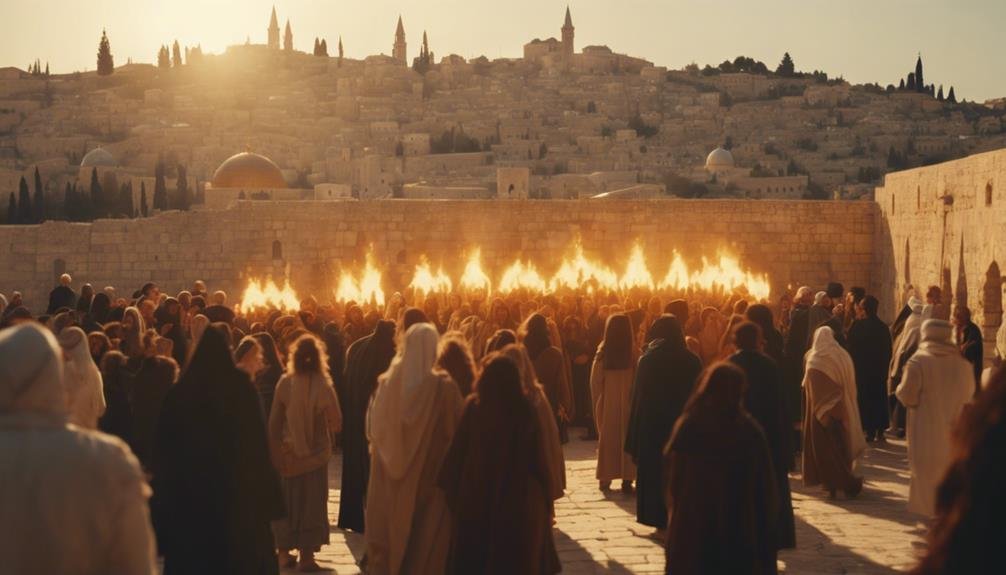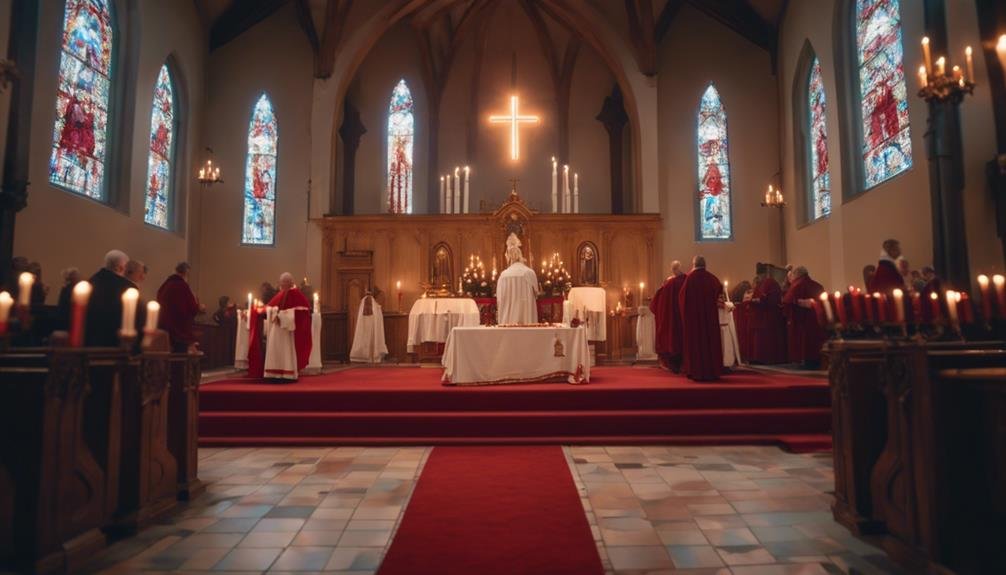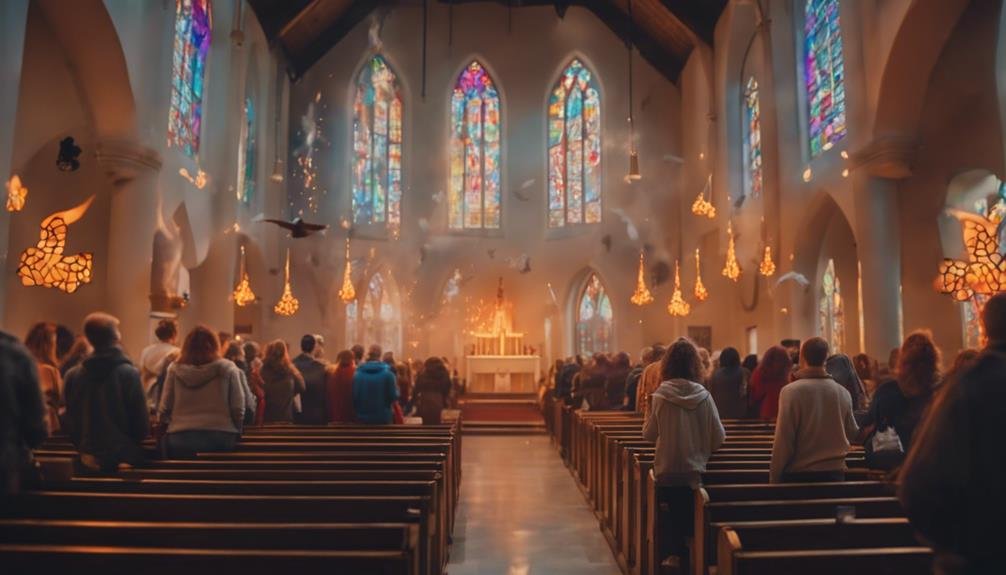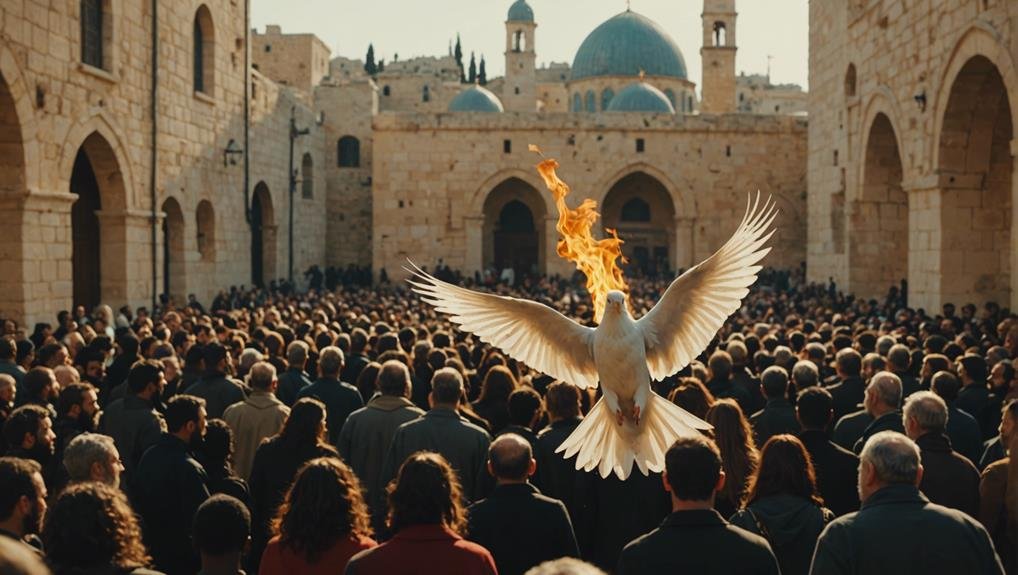When you think about Pentecost, you might recall its roots in the Greek word ‘Pentēkostē,’ but there’s more to uncover beyond its linguistic origin. This festival, celebrated fifty days after Easter, marks a pivotal moment in Christian history—the Holy Spirit’s descent upon the Apostles.
Imagine their empowerment, suddenly able to communicate with diverse crowds and spread the Gospel far and wide.
As you explore further, consider how this event symbolizes the birth of the Christian Church and reflects the broader themes of spiritual empowerment and unity. Have you ever wondered how these themes are celebrated today?
Key Takeaways
- Pentecost, from the Greek word “Pentēkostē,” meaning “fiftieth,” is celebrated fifty days after Easter in Christianity.
- It marks the Holy Spirit’s arrival and the Christian Church’s birth.
- In Acts 2, the apostles were empowered to speak different languages, leading to widespread conversion and baptism.
- Liturgical practices include priests wearing red vestments, special prayers, and altar decorations symbolizing the Holy Spirit’s fire.
- Modern significance involves celebrating the Holy Spirit’s role in empowering believers and unifying the global Church.
Origin and Meaning

Understanding the origin and meaning of Pentecost begins with its Greek roots, where ‘Pentēkostē‘ signifies ‘fiftieth.’ The term initially referred to the Jewish festival of Shavuot, celebrated fifty days after Passover. This important feast marked the giving of the Law at Mount Sinai, a pivotal event in the Old Scriptures.
In the Christian context, Pentecost is celebrated fifty days after Easter and signifies the arrival of the Holy Spirit. The New Scripture, particularly the Book of Acts, describes a dramatic event on Pentecost. Jesus Christ’s followers were gathered when the Holy Spirit descended upon them.
They experienced a phenomenon described as ‘tongues of fire‘ resting on each person, enabling them to speak different languages. This miraculous event marked the birth of the Christian Church, signifying a new era of divine empowerment for believers.
In essence, Pentecost bridges its Jewish roots with its profound Christian significance. It’s a time to remember the Old Scripture’s Festival of Weeks and to celebrate the Holy Spirit’s transformative power in the New Scripture. The convergence of these elements underscores Pentecost’s rich historical and spiritual heritage.
Biblical Account
The biblical account of Pentecost, detailed in Acts chapter 2, vividly describes the Holy Spirit descending upon the Apostles in Jerusalem during the festival of Shavuot.
As the Apostles gathered, a sound like a mighty rushing wind filled the house, and they saw what looked like tongues of fire resting on each of them. This marked the descent of the Holy Spirit, empowering the Apostles to speak in different languages.
This miraculous event allowed the Apostles to communicate the Gospel to the diverse crowd in Jerusalem. People from various regions attending Shavuot were amazed to hear the languages spoken by the Apostles. This moment signified the beginning of the Christian Church’s mission to spread the teachings of Jesus to the world.
Peter, one of the Apostles, stood up and delivered a powerful sermon, explaining that the outpouring of the Holy Spirit fulfilled Joel’s prophecy. His words resonated with many, leading to the conversion and baptism of about three thousand people.
Therefore, the Acts of the Apostles record this pivotal event, establishing the foundation for the Christian Church’s global mission.
Liturgical Practices

During Pentecost, priests wear red vestments to symbolize the Holy Spirit’s flames. This vibrant color signifies the fiery tongues that descended on the apostles, marking the descent of the Holy Spirit. You’ll notice special prayers and readings that commemorate this pivotal event in Christian history during church services.
One of the key Pentecost liturgical practices includes the adornment of the altar with red frontal cloths, further highlighting the theme of the Holy Spirit’s fire. These services are often filled with joyful hymns and readings from the Acts of the Apostles, recounting the original Pentecost.
Pentecost is also a popular time for confirmation and ordination ceremonies. These sacraments are deeply connected to the Holy Spirit, making this season particularly meaningful for those being confirmed or ordained.
The church community gathers to support these individuals, celebrating their commitment and the Holy Spirit’s empowerment. In addition to these formal practices, some regions have unique customs that enrich the Pentecost observance.
While these vary widely, they often include dancing, processions, or other local traditions that add a special flair to the celebration. Each element plays a role in making Pentecost a distinct and spiritually significant time in the liturgical calendar.
Cultural Traditions
While the liturgical practices of Pentecost focus on the Church’s formal ceremonies, cultural traditions bring a vibrant array of local customs and celebrations to the holiday. Across various regions, Pentecost features festivals, processions, and festive meals that highlight the communal and joyous nature of the occasion.
These celebrations often include folk customs, dancing, and spring rites that connect communities to their cultural heritage.
In some areas, baptisms are a central part of Pentecost, symbolizing spiritual renewal and welcoming new members into the faith. Special liturgies mark the day, and priests may don red vestments symbolizing the Holy Spirit’s fire or white vestments in some traditions.
Confirmation and ordination ceremonies also play significant roles, emphasizing the strengthening and growth of the church community.
Processions through towns and villages inject a sense of unity and shared purpose, while festive meals bring families and friends together to celebrate.
Each cultural tradition adds a unique flavor, yet all honor the core significance of Pentecost. These diverse practices enrich the holiday, making it a time of spiritual reflection and communal joy.
Modern Significance

Pentecost’s modern significance lies in its celebration of the Holy Spirit’s role in empowering believers and unifying the global Church.
This event commemorates the day the Apostles were filled with the Holy Spirit, giving them the strength and courage to undertake an international mission to spread the Gospel.
Today, Pentecost is a powerful reminder of the spiritual renewal believers experience when they open their hearts to the Holy Spirit.
As a modern believer, you must reflect on how the Holy Spirit empowers you daily. This empowerment isn’t limited to spiritual leaders or historical figures; it’s available to everyone, fostering unity and diversity within the Church. Pentecost serves as a call to action for the global mission, urging you to actively participate in spreading the Gospel.
Modern Pentecost celebrations often feature special church services, prayers, and symbols like fire and doves representing the Holy Spirit.
These traditions underscore the significance of spiritual renewal and the ongoing impact of the Holy Spirit in uniting believers worldwide. You contribute to a more unified and spiritually vibrant global church by embracing the Holy Spirit’s guidance.
Musical Expressions
Musical expressions of Pentecost bring the celebration to life through hymns and songs that honor the Holy Spirit‘s descent. You’ll find that many churches incorporate special Pentecost-themed music into their worship services.
These songs often emphasize the themes of the Holy Spirit, unity among believers, and the birth of the Church. They create a worshipful atmosphere that enhances the celebration of Pentecost.
Hymns and songs celebrating Pentecost frequently feature lyrics that reflect the powerful imagery of fire and wind, symbolizing the Holy Spirit’s arrival.
This music speaks of empowerment and the spreading of the Gospel, reminding you of the transformative events of that day. Singing about the descent of the Holy Spirit fosters a sense of unity and shared purpose among the congregation.
As you participate in these musical expressions, you’ll feel a deeper connection to the essence of Pentecost. The music doesn’t just celebrate a past event; it actively empowers you and your community to live out the Gospel.
Through these worshipful hymns and songs, the celebration of Pentecost becomes a vibrant, living experience that continues to inspire and unify believers today.
Conclusion
In celebrating Pentecost, you’ll embrace a profound tradition that unites believers across time and space. With its rich origins, powerful biblical narratives, and diverse practices, Pentecost isn’t just a historical event—it’s a living, breathing demonstration of faith.
By participating in this vibrant festival, you’ll feel the Spirit’s empowering presence, inspiring you to share the message of Christ with renewed enthusiasm. Let’s honor this day, remembering our shared mission and the divine guidance that leads us.

